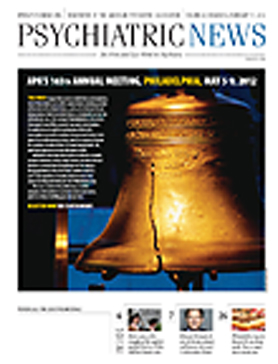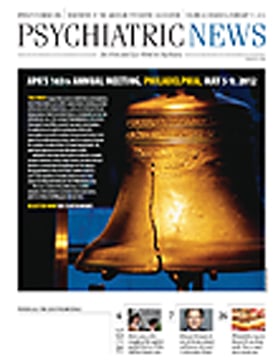SYMPOSIA
S10. Social Stress and Drug Addiction in Preclinical and Clinical Studies: Sex/Gender Matters in Effects on Brain and Behavior and Treatment Implications
1. Monkey Models of Social Stress and Cocaine Abuse: Sex Differences Michael A. Nader, Ph.D.
2. Social Stress Differentially Affects Drug Reward in Adolescent Male and Female Rats Sari Izenwasser, Ph.D.
3. From Picture to Practice: The Role of Gender and Affect on the Neural Response to Social Stress in Cocaine Users Colleen A. Hanlon, Ph.D.
4. Sex Difference in Reactivity to Laboratory-Induced Stress and Drug Cues Sudie Back, Ph.D.
S11. Field Trial Testing of Proposed Revisions to DSM-5: Findings and Implications American Psychiatric Institute for Research and Education
1. DSM-5 Field Trials: New Methods, New Insights Helena C. Kraemer, Ph.D.
2. DSM-5 Field Trials in Academic or Large Clinical Settings: Detailed Findings for Schizophrenia, Depression, and ADHD Darrel A. Regier, M.D., M.P.H.
3. DSM-5 Field Trials in Academic or Large Clinical Settings: Summary and Implications Diana E. Clarke, Ph.D., M.Sc.
4. Dimensional Measures in Psychiatric Diagnosis: Results From the DSM-5 Field Trials William E. Narrow, M.D., M.P.H.
5. Testing DSM-5 in Routine Clinical Practice Settings: Trials, Tribulations, and Triumphs Eve K. Moscicki, Sc.D., M.P.H.
S12. Rebound and Recovery in the Athlete International Society for Sport Psychiatry
1. Doping in Sports: What‘s on the Horizon? David A. Baron, D.O.
2. Sexual Harassment and Abuse in Sports: What It Is, How to Prevent It. Discussion With Former NHL Player Sheldon Kennedy Saul I. Marks, M.D.
3. Psychological Impact of Injury on the Athlete Thomas S. Newmark, M.D.
4. Doping in Elite Cycling: A Psychiatric Perspective on Causes, Consequences, Recovery, and Rehabilitation Alan Currie, M.B.B.S.
S13. Time-Limited Psychotherapy for Cancer: From Diagnosis to Remission or End of Life
1. Assessment and Treatment of Cancer Patients for Time-Limited Psychotherapy: Who’s Appropriate at What Stage? Anton C. Trinidad, M.D.
2. Palliative Psychotherapy—When the Prognosis Seems Bleak Lorenzo Norris, M.D.
3. Case Presentation I Amanda Crosier, M.D.
4. Case Presentation II Sanaz Kumar, M.D.
S14. When Your Patient Is a Parent: Supporting the Family and Addressing the Needs of Children
1. Overview of Needs of the Children of Parents With Mental Illness Alison M. Heru, M.D.
2. Clinical Implications of Evidence-Based Preventive Interventions for Families With Parental Depression William R. Beardslee, M.D.
3. A Family Perspective from Julie Totten, President and Founder of Families for Depression Awareness Julie Totten, M.B.A.
S15. Pros and Cons of SPECT Brain Imaging: What Is the Status of the Science?
1. Capturing Mental Illness in a Brain Scan: Dream or Reality? Anissa Abi-Dargham, M.D.
2. SPECT Imaging in Psychiatric Practice: Ready for Prime Time? Jair C. Soares, M.D.
3. Brain SPECT Imaging Is Immediately Useful in Clinical Practice Daniel G. Amen, M.D.
4. Bringing SPECT Functional Neuroimaging Into Perspective Theodore A. Henderson, M.D., Ph.D.
S16. Forensic Psychiatry: Informing Clinical Practice
1. Looking Beyond Patients’ Denial of Suicidal Ideation: Assessing Observable Evidence-Based Risk Factors Robert I. Simon, M.D.
2. Disability Evaluations: A Model for Assessment Liza H. Gold, M.D.
3. Neuroimaging in Forensic Psychiatry: Current Status and Future Directions Robert P. Granacher, M.D., M.B.A.
4. Correctional Psychiatry Joseph Penn, M.D.
5. The Internet and Psychiatry: An Update on Legal and Ethical Considerations Patricia R. Recupero, M.D., J.D.
6. Child Forensic Psychiatry: 21st Century Practice Cheryl D. Wills, M.D.
S17. STEPPS (Systems Training for Emotional Predictability and Problem Solving): Treating Borderline Personality Disorder in Diverse Settings Around the Globe
1. Overview of STEPPS Treatment Program and Its Implementation in Correctional Settings (Prisons and Community Corrections) Nancee S. Blum, M.S.W., L.C.S.W.
2. Implementing STEPPS in Different Service Settings in the United Kingdom Renee Harvey, M.A.
3. STEPPS in the Netherlands: The Efficacy in a Group of Dutch Patients With Borderline Personality Disorder and With Borderline Personality Features E. van Wel, M.D.
4. STEPPS Treatment of Inpatients With Mood Disorders and Co-occurring Borderline Personality Disorder Diagnosis: Preliminary Results From a One-Year Follow-Up Study Andrea Fossati, M.D., Ph.D.
S18. Narcissistic Personality Disorder in DSM-5: Impact on Research, Diagnosis, and Treatment
1. Narcissistic Personality Disorder in DSM-5 Andrew E. Skodol, M.D.
2. Finding Common Denominators: Understanding the Association of Depression, Depressive Personality, and Hypersensitive (Vulnerable) Narcissism Steven Huprich, Ph.D.
3. Narcissistic Grandiosity and Narcissistic Vulnerability: Clinical Examples, Current Research, and Implications for DSM-5 Aaron L. Pincus, Ph.D.
4. Narcissistic Personality Disorder: An Interactive Exploratory Diagnostic Process Elsa Ronningstam, Ph.D.
5. Transference-Focused Psychotherapy for Narcissistic Personality Disorder Diana Diamond, Ph.D.
S19. Philosophical and Pragmatic Problems for DSM-5
1. The Ideology Behind DSM-5 Joel Paris, M.D.
2. The Conceptual Status of DSM Diagnoses James E. Phillips, M.D.
3. Considering the Economy of DSM Alternatives John Z. Sadler, M.D.
4. What Are the Benefits and Risks of Conservatism? G. Scott Waterman, M.D.
5. The Pragmatic Context of Psychiatric Diagnosis Joseph M. Pierre, M.D.
S20. New Paradigms for Investigating Relational Disturbances in Borderline Personality Disorder
1. Attachment and Cognition in BPD: Problems in Integrating Complex Information in Emotionally Stimulated Attachment Contexts Lois W. Choi-Kain, M.D., M.Ed.
2. Rejection Sensitivity as a Distinguishing Feature of Borderline Personality Disorder Valerie I. Photos, Ph.D.
3. Empathy, Attachment, and Borderline Personality: Genetic, Neurobio-logical, and Developmental Perspectives Luis H. Ripoll, M.D.
4. Emerging Investigational Paradigms for the Empirical Study of Rejection Sensitivity Alex S. Keuroghlian, M.D., M.Sc.
5. Neuroimaging of Social Exclusion in Borderline Personality Disorder Anthony C. Ruocco, Ph.D.

